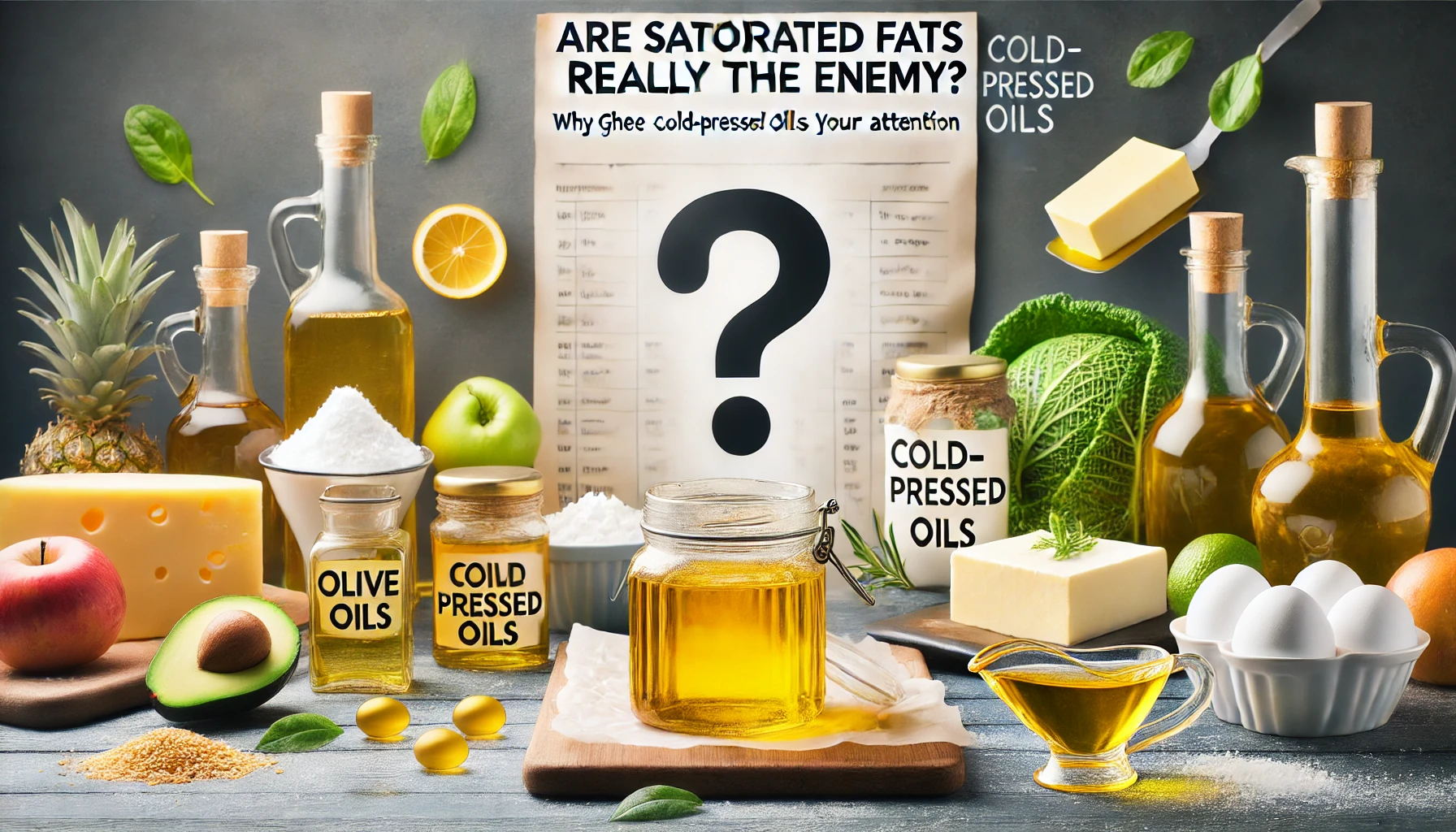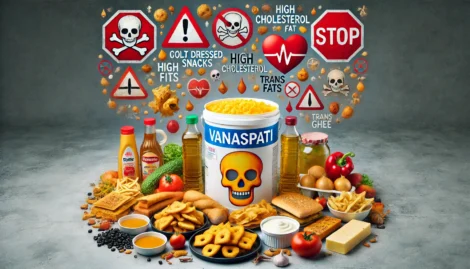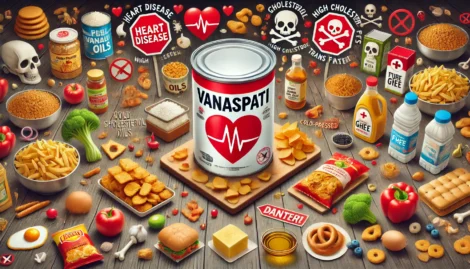- You have no items in your shopping cart
- Subtotal: ₹0.00
Are Saturated Fats Really the Enemy? Why Ghee and Cold-Pressed Oils Deserve Your Attention
For decades, saturated fats have been the subject of fierce debate among health professionals and nutritionists. The traditional belief has long held that saturated fats contribute to heart disease, high cholesterol, and a myriad of health issues. As a result, we’ve been advised to reduce saturated fat consumption, often opting for vegetable oils or other “healthier” fat sources. But is saturated fat really the enemy it’s been made out to be?
Recent studies suggest that the controversy surrounding saturated fats might not be as clear-cut as we once believed. Particularly, ghee and cold-pressed oils such as coconut oil have emerged as nutrient-rich fats that offer various health benefits. These fats are not only deeply ingrained in traditional cuisines but are now being recognized for their positive effects on heart health, metabolism, and overall well-being.
In this comprehensive article, we’ll dive deep into the controversy around saturated fats, explore the health benefits of ghee and cold-pressed oils, and back up these points with credible research. By the end, you might just be reconsidering the role of saturated fats in your diet.
Understanding Saturated Fats: A Long-Standing Controversy
The war on saturated fats began in the 20th century, largely due to research that linked them to increased cholesterol levels and a higher risk of heart disease. Based on studies like the Seven Countries Study led by Ancel Keys in the 1950s, dietary guidelines in many countries started advising people to reduce their intake of foods high in saturated fats.
As a result, many people replaced traditional fats like ghee and coconut oil with refined vegetable oils, which were believed to be healthier due to their lower levels of saturated fat. However, as new research emerges, it seems that the story is more nuanced than it initially appeared.
What Are Saturated Fats?
Saturated fats are fats in which the fatty acid chains contain no double bonds between carbon atoms. This gives them a solid structure at room temperature. Foods high in saturated fats include:
- Ghee
- Coconut oil
- Butter
- Lard
- Cheese
- Fatty cuts of meat
Saturated fats have been shown to raise LDL cholesterol (commonly referred to as “bad” cholesterol), which was once believed to be the main driver of heart disease. However, modern research has revealed that not all LDL is harmful, and the impact of saturated fats on health depends on the overall quality of the diet and the type of LDL.
The Case for Ghee: A Healthy Saturated Fat
Ghee, also known as clarified butter, is a staple in Indian cooking and Ayurvedic medicine. Unlike regular butter, ghee has had its water and milk solids removed, making it richer in fat and less prone to spoilage. What makes ghee particularly special is that it has been used for centuries as both a cooking fat and a medicinal ingredient.
Health Benefits of Ghee
- Rich in Butyrate: Ghee is one of the best sources of butyric acid, a short-chain fatty acid that supports digestive health. Butyrate has been linked to lower inflammation, improved gut health, and even a reduced risk of colon cancer.
- High Smoke Point: With a smoke point of around 450°F (232°C), ghee is an excellent choice for high-heat cooking. It doesn’t break down into harmful compounds as quickly as other oils, making it safer for frying and sautéing.
- Supports Heart Health: Contrary to popular belief, moderate consumption of ghee can support heart health. A study published in the Journal of Biomedical Research found that ghee increases HDL cholesterol (the “good” kind) while having minimal effects on LDL cholesterol.
- Rich in Fat-Soluble Vitamins: Ghee is an excellent source of vitamins A, D, E, and K, all of which are crucial for maintaining healthy skin, bones, and immune function.
- Lactose-Free: Since the milk solids are removed during the clarification process, ghee is generally safe for those with lactose intolerance.
Scientific Studies Supporting Ghee
One study published in the American Journal of Clinical Nutrition suggested that moderate ghee consumption, particularly when part of a balanced diet, does not increase the risk of heart disease. Instead, the researchers found that ghee could improve lipid profiles by raising levels of HDL cholesterol.
Another study in the Indian Journal of Medical Research explored the effects of ghee on cholesterol levels. It found that ghee did not significantly raise total cholesterol levels in healthy individuals and even demonstrated some cardioprotective effects.
Cold-Pressed Oils: The Nutrient-Rich Alternative
Cold-pressed oils, also known as extra virgin oils, are extracted through a mechanical process without the use of heat or chemicals. This method preserves the oil’s natural nutrients, making cold-pressed oils far superior to refined oils. Popular cold-pressed oils include coconut oil, olive oil, sesame oil, and groundnut oil.
What Makes Cold-Pressed Oils Superior?
- Nutrient Retention: Cold-pressed oils retain their natural antioxidants, vitamins, and fatty acids, which are often destroyed during the refining process. For example, cold-pressed coconut oil contains high levels of lauric acid, a fatty acid with antimicrobial properties.
- No Chemicals or Solvents: Commercially refined oils are typically extracted using hexane, a petroleum-based solvent. Cold-pressed oils are free from chemicals, making them a cleaner, healthier option.
- Anti-Inflammatory Properties: Cold-pressed oils like coconut oil are rich in anti-inflammatory compounds. These oils can help reduce inflammation in the body, which is linked to many chronic diseases, including heart disease, diabetes, and arthritis.
Health Benefits of Cold-Pressed Oils
- Improves Heart Health: Studies suggest that cold-pressed oils, particularly cold-pressed coconut oil, can improve heart health by increasing levels of HDL cholesterol and supporting vascular function.
- Boosts Metabolism: Coconut oil, in particular, is known to contain medium-chain triglycerides (MCTs), which are easily converted into energy and may help boost metabolism. This makes it an excellent fat for those looking to manage their weight.
- Rich in Antioxidants: Cold-pressed oils are full of antioxidants like vitamin E and polyphenols, which help protect the body against oxidative stress and reduce the risk of chronic diseases.
Scientific Studies Supporting Cold-Pressed Oils
A study in the Journal of Lipid Research found that virgin coconut oil improved cholesterol levels in animals and may offer similar benefits in humans. Another study in Lipids in Health and Disease found that cold-pressed oils reduced inflammation and improved liver function in participants.
The Problem with Commercially Refined Oils
Commercially refined oils are extracted using heat and chemicals, a process that strips the oil of its natural nutrients. Refined oils like canola, soybean, and corn oil are often subjected to bleaching, deodorizing, and chemical treatments to improve their shelf life and appearance.
Why Refined Oils Are Bad for Your Health
- Loss of Nutrients: The refining process destroys many of the beneficial compounds found in oils, including vitamins, antioxidants, and healthy fats. This leaves behind an inferior product that may be harmful to health.
- Inflammation: Refined oils are often high in omega-6 fatty acids, which can promote inflammation when consumed in excess. A diet high in omega-6 and low in omega-3 can contribute to chronic inflammation, which is linked to heart disease, diabetes, and other health conditions.
- Contains Trans Fats: During the refining process, some oils undergo hydrogenation, a process that turns liquid oil into solid fat. This produces trans fats, which have been shown to increase the risk of heart disease, stroke, and type 2 diabetes.
Scientific Studies on Refined Oils
A study in the Journal of the American College of Cardiology found that diets high in trans fats, often found in hydrogenated oils, are associated with a higher risk of coronary heart disease. Another study published in Nutrients revealed that consuming a high ratio of omega-6 to omega-3 fatty acids could promote chronic inflammation and lead to heart disease.
Debunking the Myths Around Saturated Fats
One of the main reasons people avoid ghee and cold-pressed oils is because they are high in saturated fats. However, recent research challenges the traditional view that saturated fats are inherently harmful.
1. Saturated Fats and Heart Disease
For years, we were told that saturated fats clog arteries and cause heart disease. But a meta-analysis published in the British Medical Journal found no significant evidence that saturated fat increases the risk of cardiovascular disease. In fact, the study concluded that replacing saturated fat with polyunsaturated fats may not significantly reduce the risk of heart disease.
2. Saturated Fats and Cholesterol
While saturated fats can raise LDL cholesterol, they also raise HDL cholesterol, which is protective against heart disease. Moreover, not all LDL cholesterol is harmful. Large, fluffy LDL particles are relatively benign, while small, dense LDL particles are more dangerous. Saturated fats tend to increase the larger, less harmful type of LDL.
Why Ghee and Cold-Pressed Oils Deserve a Place in Your Diet
Given the growing body of research, it’s clear that ghee and cold-pressed oils offer numerous health benefits, and their consumption can be part of a balanced, heart-healthy diet. Whether you’re looking for a cooking oil with a high smoke point, a source of healthy fats, or a nutrient-rich addition to your meals, ghee and cold-pressed oils should be at the top of your list.
The Case for Ghee:
- High Smoke Point: Ideal for Indian cooking techniques like frying and sautéing.
- Rich in Nutrients: Full of fat-soluble vitamins and antioxidants.
- Supports Heart Health: Raises HDL cholesterol and contains anti-inflammatory compounds.
The Case for Cold-Pressed Oils:
- Nutrient-Dense: Retains natural antioxidants and fatty acids.
- Free from Chemicals: No chemical solvents or preservatives.
- Versatile: Can be used for cooking, skin care, and even hair care.
Conclusion: Embrace Ghee and Cold-Pressed Oils
In conclusion, the controversy around saturated fats is slowly being debunked by modern research. Ghee and cold-pressed oils, despite their high saturated fat content, offer a range of health benefits that make them a valuable addition to any diet. Whether you’re looking to improve heart health, boost metabolism, or simply enjoy the rich flavors of traditional fats, these oils deserve a place in your kitchen.
So, next time you’re reaching for cooking oil, consider choosing ghee or a cold-pressed oil for a healthier, more flavorful option. Not only are these fats beneficial for your health, but they also add a unique depth of flavor to your dishes that refined oils simply can’t match.




